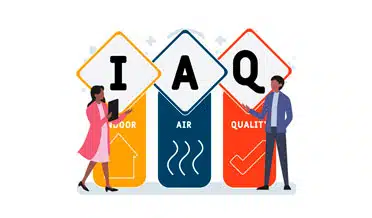10 Tips to Improve Indoor Air Quality
Indoor Air Quality Tips for Homeowners
With warmer weather on the way, we have opportunities to spend more time in the great outdoors; we take walks and hikes, go to the beach or the mountains, and attend great outdoor events. Being outdoors is a very good escape when we can. We spend 90% of our time indoors and, while we feel quite comfortable, research tells us that the air quality in our workspaces and homes is 2 to 5 times more polluted than the outdoors.1
Common Pollutants
Each space is unique, so it is impossible to name the specific pollutants for your home, but we can begin with some common culprits and develop a plan to improve air quality.
- Products of combustion. Carbon monoxide and carbon dioxide, along with other airborne particulates are found in our homes in larger quantities than we imagine. For some homes, tobacco smoke contributes to pollution. Some homes use natural gas for heat, cooking, and heating water. We so enjoy cooking outdoors and we bring a portion of the smoke indoors. All our homes are in close contact with the exhaust from planes, trains, and automobiles.
- Volatile organic compounds are chemicals that “off gas” from manufactured materials; we often associate the smell with “new.” These chemicals are given off by flooring, paints, and furniture; the process will last for several years.
- Organic Sources. Another source of airborne particles comes from the organisms that live all around us. Pollen from grass, trees, and wildflowers enters our homes on clothes and shoes. The air is full of other organic materials: mold and mildew spores, bacteria, and viruses are blowing in the wind. We make our own contributions—dust is primarily composed of skin cells we no longer need. Our pets can’t be left out; their “dust contribution is called dander.
What’s to Be Done?
The key to improving indoor air quality is dilution. That means reducing the number of particles that come into a home and giving plenty of means for them to escape.
- Don’t “warm up” the car in the garage. Allow some time for the exhaust to leave the garage before opening the door into the house.
- Be sure to maintain and use the exhaust systems for appliances that use natural gas or propane. This applies to furnaces, water heaters, and gas stoves.
- Keep the windows and doors closed while cooking outdoors or using a firepit.
- Your HVAC system is an advanced ventilation system, designed to remove particles with every heating or cooling cycle. To keep it functioning properly, the filter needs to be changed frequently—at least every three months.
- Examine your ductwork and clean the ducts as needed; approximately every 3 to 5 years is recommended.
- Use fans as needed. That includes bathroom fans during showers and the stovetop fan while cooking. This removes excess moisture, preventing the growth of mold and mildew.
- Dilute the indoor pollutants by opening a window approximately once per week for about 15 or 20 minutes. This allows the volume of the entire house to exchange with outside air. During the summer, the optimal time for ventilation is before 10 am or after 9 pm.2
- Work with the plants around you. Understand the predominate season for pollen in your immediate area. Remember that rain can increase mold spores. Take shoes off at the door to avoid tracking pollen throughout the home. Indoor plants remove some of the chemical particles but can contribute to organic particles; use houseplants wisely.
- Groom pets appropriately to reduce the amount of dander.
- Clean regularly. That goes without saying, but when you remove the accumulation of dust, you remove it forever.
Let us help with your Indoor Air Quality Questions!
Schedule your free Indoor Air Quality consultation by calling AllCool AC & Heating at 281-238-9292 or contact us via email.
1 https://www.epa.gov/report-environment/indoor-air-quality#:~:text=The%20potential%20impact%20of%20indoor,higher%20than%20typical%20outdoor%20concentrations
2 https://www.energuide.be/en/questions-answers/how-to-air-your-house-properly/1712/
